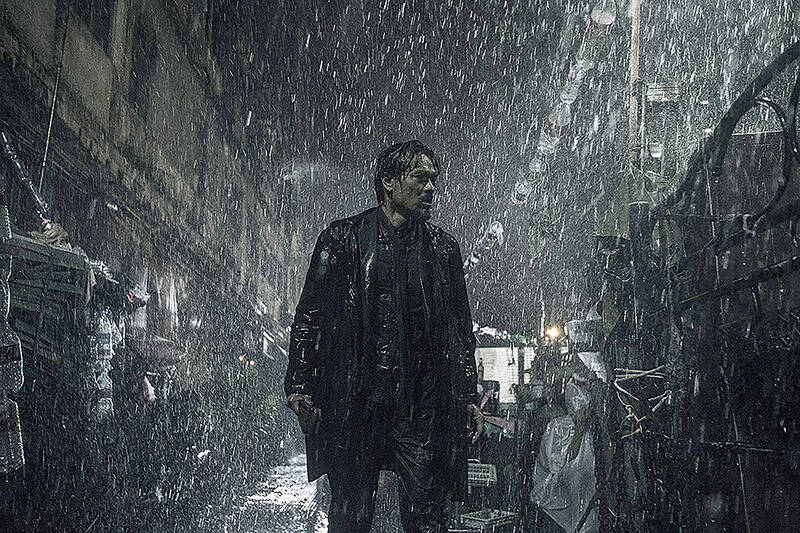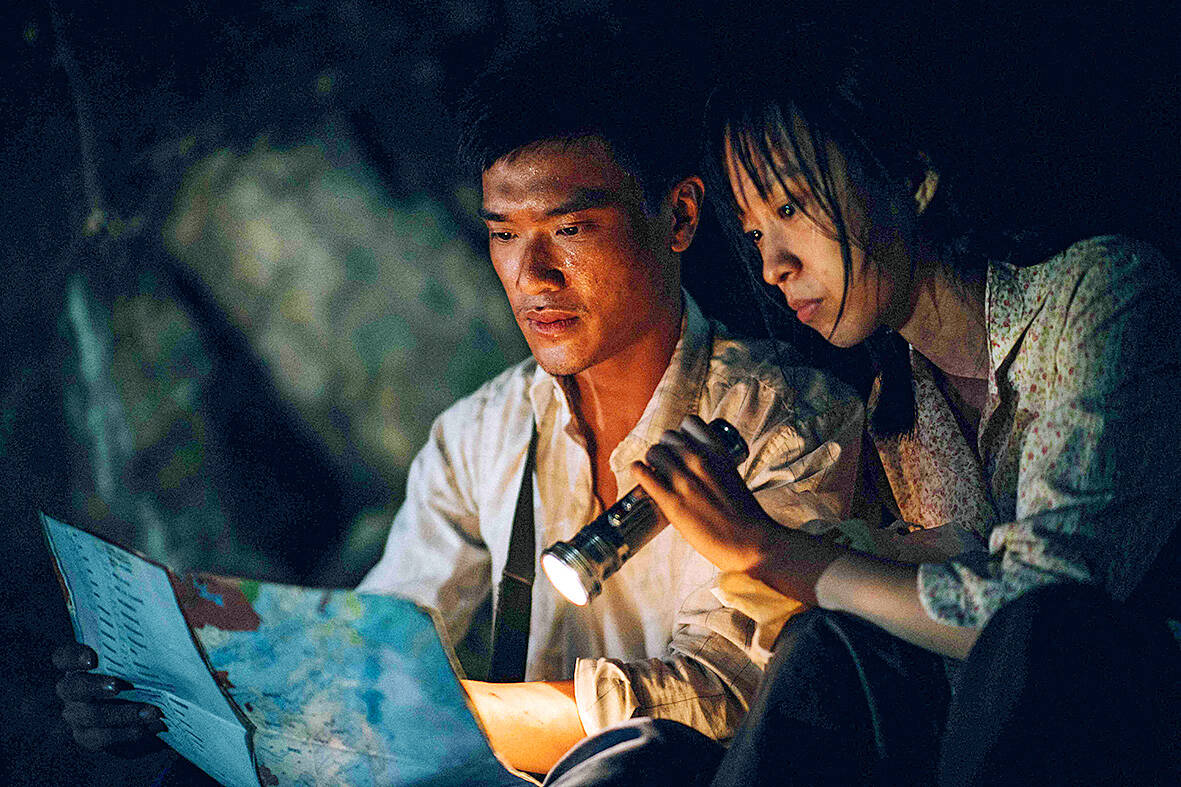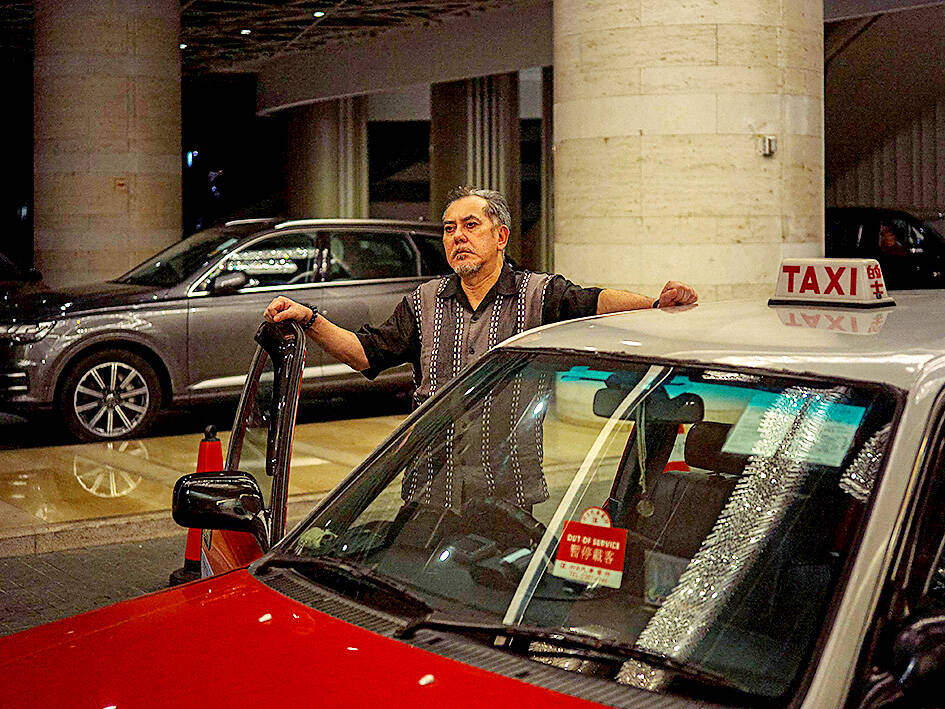Crime thriller Limbo leads the pack at the Golden Horse Film Awards in a strong showing for Hong Kong despite veiled warnings from Chinese authorities against joining the prestigious Taiwan-based event.
Dubbed the Chinese-language Oscars, Saturday’s Golden Horse awards are now in the fourth straight year without any mainstream Chinese films due to political tensions between Beijing and Taipei.
Most Chinese and Hong Kong A-listers who used to fill the red carpet have shunned the event after a Taiwanese director voiced support for the island’s independence in an acceptance speech in 2018.

Photo: AFP
China claims the self-ruled democratic island as part of its territory and has long blacklisted Taiwanese entertainers for any perceived support for independence.
There were no Chinese films in the 2019 nomination list and several Hong Kong movies dropped out that year, while big commercial productions were conspicuously absent at both the 2020 and 2021 awards.
This year marks something of a shift with seven Hong Kong films in the running, including five features and two documentaries, in what organizers described as “the best showing in five years” for the city.

Photo: AFP
Five indie works from China are also contending, although there is still no submission of a feature-length film or major commercial release.
‘THINK TWICE’
Just days before the nominations were announced in September, the Hong Kong Motion Picture Industry Association urged members to “think twice” about getting involved in the Golden Horse awards, describing them as “gradually politicized.”

Photo: AFP
Beijing’s Taiwan Affairs Office echoed that disapproval, saying it supported cultural exchanges with Taiwan but “for activities that have political overtones, it’s a different matter.”
Black-and-white crime noir Limbo, which has the most nods at 14, is vying for best picture against another Hong Kong drama The Sunny Side of the Street and three Taiwanese films.
But it is unclear if many of the Hong Kong or Chinese nominees will travel to Taipei.
Cya Liu (劉雅瑟), nominated for best actress in Limbo, has confirmed via her Hong Kong agency that she will not attend the ceremony, without giving any reasons.
“I think they want to win but in the current political environment it’s probably inevitable that neither the director nor the cast will be present” except for Taiwanese-American actor Mason Lee (李淳), film critic Wonder Weng said.
Mason Lee is the son of Oscar-winning Taiwanese director Ang Lee (李安), who is a staunch Golden Horse supporter and regularly chairs its jury, a role that is taken up by veteran Hong Kong director Ann Hui (許鞍華) this year.
“It would be really awkward... if a film that is recognized with 14 nominations does not appear to support, or even boycott” the event, said Weng of Taiwan’s Film Critics Society.
Soi Cheang (鄭保瑞), who is nominated for best director for Limbo, declined a request for comment.
‘A DOOR FOR INDIE FILM’
The Golden Horse awards have become a bulwark against Beijing’s tightening grip on creative freedoms and often showcase titles that would not get past censors in China and Hong Kong.
At last year’s awards, the best documentary prize went to Hong Kong director Kiwi Chow’s (周冠威) Revolution of Our Times.
The film explored the huge and sometimes violent democracy protests that swept the business hub in 2019 but cannot be shown there.
Once the crucible of Cantonese cinema and a bastion of free speech, Hong Kong is being transformed into a mirror of the authoritarian mainland after those protests.
A national security law has criminalized much dissent and film censorship powers have been strengthened.
Some of the Chinese films nominated this year also touch on sensitive subjects.
Short film Frontier explores the stereotyping and discrimination against China’s Uighur minority. Will You Look at Me (當我望向你的時候) is a documentary about homosexuality while Silence in the Dust (塵默呼吸) focuses on laborers suffering from industrial pollution.
“Some say the Golden Horse may become less influential with fewer big movies submitting but I think it’s crucial that... it opens a door for these independent films,” said commentator Weng.
“It is the only outlet for their voices to be heard” in Chinese-language film festivals and awards, he added. Hong Konger Chan Tze-woon’s (陳梓桓) Blue Island (憂鬱之島) is nominated for best documentary. It focuses on the city’s democracy movement and what he calls “a desperate attempt to capture the final moments of a sinking island.”
“I hope more people will know about the film after it’s nominated, and that it will let more people continue to discuss Hong Kong,” said Chan, who said he plans to attend Saturday’s ceremony.
“I also hope the nomination will encourage more filmmakers to keep making free films,” he said.

June 2 to June 8 Taiwan’s woodcutters believe that if they see even one speck of red in their cooked rice, no matter how small, an accident is going to happen. Peng Chin-tian (彭錦田) swears that this has proven to be true at every stop during his decades-long career in the logging industry. Along with mining, timber harvesting was once considered the most dangerous profession in Taiwan. Not only were mishaps common during all stages of processing, it was difficult to transport the injured to get medical treatment. Many died during the arduous journey. Peng recounts some of his accidents in

“Why does Taiwan identity decline?”a group of researchers lead by University of Nevada political scientist Austin Wang (王宏恩) asked in a recent paper. After all, it is not difficult to explain the rise in Taiwanese identity after the early 1990s. But no model predicted its decline during the 2016-2018 period, they say. After testing various alternative explanations, Wang et al argue that the fall-off in Taiwanese identity during that period is related to voter hedging based on the performance of the Democratic Progressive Party (DPP). Since the DPP is perceived as the guardian of Taiwan identity, when it performs well,

The Taiwan People’s Party (TPP) on May 18 held a rally in Taichung to mark the anniversary of President William Lai’s (賴清德) inauguration on May 20. The title of the rally could be loosely translated to “May 18 recall fraudulent goods” (518退貨ㄌㄨㄚˋ!). Unlike in English, where the terms are the same, “recall” (退貨) in this context refers to product recalls due to damaged, defective or fraudulent merchandise, not the political recalls (罷免) currently dominating the headlines. I attended the rally to determine if the impression was correct that the TPP under party Chairman Huang Kuo-Chang (黃國昌) had little of a

A short walk beneath the dense Amazon canopy, the forest abruptly opens up. Fallen logs are rotting, the trees grow sparser and the temperature rises in places sunlight hits the ground. This is what 24 years of severe drought looks like in the world’s largest rainforest. But this patch of degraded forest, about the size of a soccer field, is a scientific experiment. Launched in 2000 by Brazilian and British scientists, Esecaflor — short for “Forest Drought Study Project” in Portuguese — set out to simulate a future in which the changing climate could deplete the Amazon of rainfall. It is